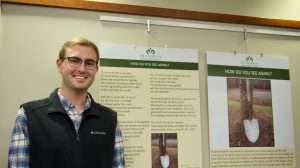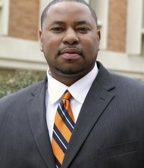College News

Tanure Ojaide, Frank Porter Graham Professor of Africana Studies at UNC Charlotte, is co-recipient of the 2018 Wole Soyinka Prize for Literature in Africa for his book, “Songs of Myself.”

With resources provided through the Levine Scholars Program and the Department of Geography & Earth Sciences, student Danielle Miller has led an effort to create a weather studio in the McEniry Building for meteorology students to use to hone their skills. “I knew we needed a space to have higher quality equipment, to get more real life experience and help our students be better prepared,” she says.

Africana Studies outgoing chair Akin Ogundiran will serve as Editor-in-Chief of African Archaeological Review (AAR). This is the oldest continent-wide journal in the field of African archaeology. The five-year appointment will provide students with the opportunity to be part of the editorial process of a major international journal, in addition to providing UNC Charlotte with more visibility as a research university, Ogundiran said.

A photo of a rusted shovel with a broken handle, aged by years of harsh Appalachian weather and hard work, sat on display in UNC Charlotte’s Atkins Library during most of November. Seth Flynn, the creator, is a senior who is minoring in gerontology; he submitted it as part of a contest hosted by the Gerontology Program, with the support of the Gerontology Club and the J. Murrey Atkins Library, which asked students to answer the question: “How do you see aging?” The work and the touching story behind it earned Flynn first place in the competition.

In his 2017 memoir At Home, Away From Home, UNC Charlotte’s Tanure Ojaide speaks of the indelible impressions from his early years in Nigeria. In his words, “One does not forget what one yearns for at heart.” At age 70, many of his poems, short stories, critical essays, and books serve as activist works calling out for justice and fairness for the people and the ecosystem of the Niger Delta.

Flu season is upon us once again. This October marked the 100th anniversary of the Influenza Epidemic (Spanish Flu) of 1918 in North Carolina, and we can learn lessons from the historic event. Lauren Austin, who earned her Public Policy Ph.D. and master’s degree in History from UNC Charlotte, researched this influenza pandemic, which left citizens “afraid to breathe,” as she describes it. Her research, with co-author Dr. William P. Brandon, appears in the book, “North Carolina’s Experience during the First World War,” co-edited by UNC Charlotte history professors Dr. Steven Sabol and Dr. Shepherd McKinley.

College of Liberal Arts & Sciences Senior Associate Dean Shawn Long has received the Lyman T. Johnson Torch of Excellence Award from the University of Kentucky Lyman T. Johnson African American alumni group, honoring his impact on other people’s lives.

Gregory Mixon, professor of history, recently received the Georgia Historical Records Advisory Council Award for Excellence in Research Using the Holdings of Archives. He was honored for the book, “Show Thyself a Man: Georgia State Troops, Colored, 1865-1905.”

Bioarchaeologists like UNC Charlotte researcher Sara L. Juengst are part archaeologist, part biological anthropologist. They study human skeletal remains to learn about and tell the stories of past communities and cultures. While archaeologists more often study settlement patterns and artifacts like ceramics or stone tools from historical excavations, bioarchaeologists study burial sites, items found at burial sites, and bones.

Members of the Charlotte-Mecklenburg community have a new way to share their opinions on a variety of issues with the launch of YourVoiceCLT. Charlotte’s Community Survey Panel was founded by the UNC Charlotte Urban Institute, the Ph.D. in Public Policy Program, the Department of Political Science and Public Administration, and the Policy Opinion, Learning and Sentiment Lab.

The LYNX Blue Line Extension’s first trip in March 2018 signaled dramatic change for UNC Charlotte and the Charlotte community. For researchers Isabelle Nilsson and Elizabeth Delmelle, the new line and the neighborhoods it passes through between Uptown Charlotte and the main campus represent a living laboratory for research exploring how transit investments affect neighborhood change and the implications for residential mobility and income segregation.

UNC Charlotte historian Aaron Shapiro thinks deeply about the impact of society’s resting places and the importance of protecting and understanding them. In his co-teaching of a history class called “Preserving Memory in the Digital Age,” Shapiro strives to help students broaden their perspectives on cemeteries and their surrounding communities, through in-depth research and class work.